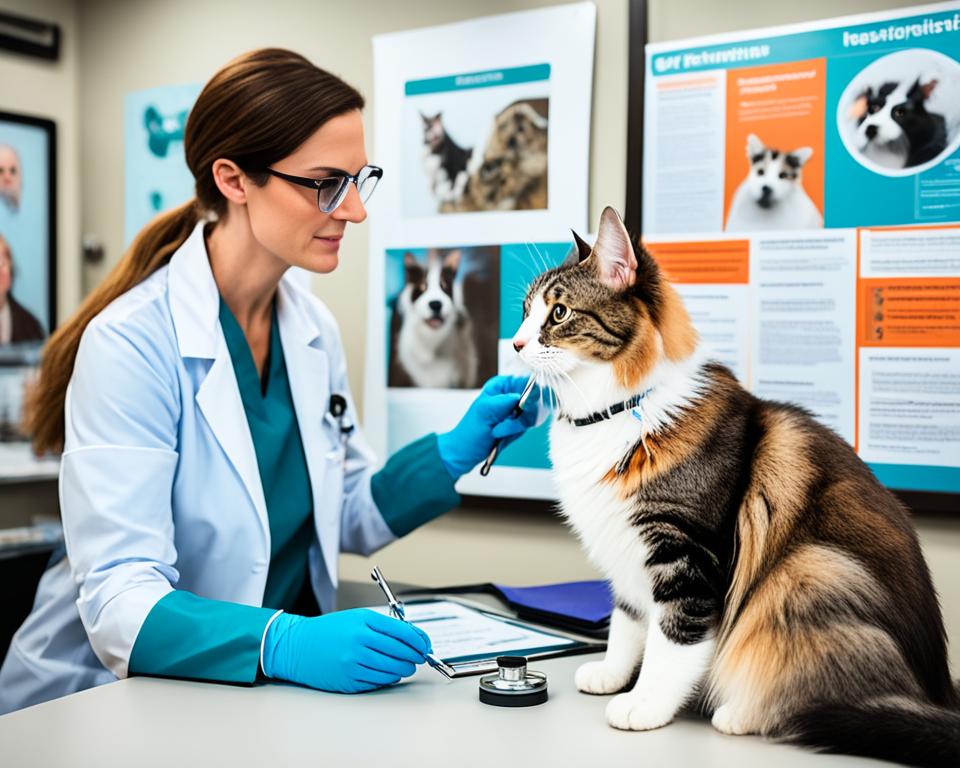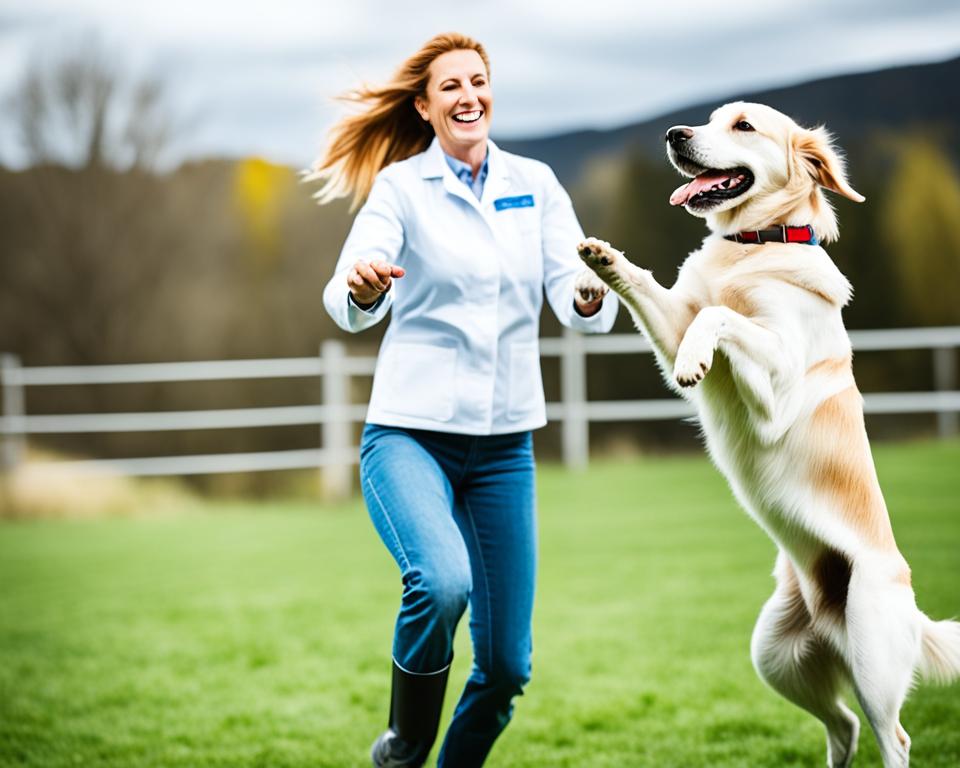Recognizing and Addressing Pet Health Concerns Early!
As responsible pet owners, it is our duty to ensure the well-being and longevity of our furry friends. One of the most important aspects of proactive pet care is recognizing and addressing any potential health concerns early on. By being observant and taking prompt action, we can prevent minor issues from escalating into more serious problems.
In this section, we will explore strategies and tips that can help us identify and address pet health problems in their initial stages. From monitoring their behavior to understanding their dietary needs, we will provide you with the knowledge and tools you need to ensure the optimal health of your beloved companion.
Key Takeaways:
- Being proactive in pet care involves recognizing and addressing health concerns early on.
- Observing changes in behavior and seeking prompt veterinary care can prevent minor issues from becoming serious.
- Monitoring your pet’s nutrition, hydration, grooming, and elimination habits can provide important insights into their overall health.
- Regular veterinary visits and preventive care are essential for early disease detection and intervention.
- By prioritizing early detection and intervention, we can ensure the well-being and longevity of our pets.
The Importance of Preventive Pet Care
Preventive pet care is essential in ensuring the health and wellness of our beloved furry friends. By taking proactive measures and prioritizing preventive veterinary visits, we can improve their overall well-being and minimize the risk of potential health issues.
Regular veterinary check-ups are a crucial aspect of preventive pet care. During these visits, veterinarians can conduct comprehensive examinations and screenings to identify any potential health concerns before they escalate. Additionally, vaccinations are an integral part of preventive pet care, as they protect our pets against various diseases.
Preventive treatments, such as deworming and flea and tick control, are also vital in maintaining the health of our pets. These treatments help prevent infestations and the spread of parasites, ensuring the comfort and well-being of our furry companions.
By investing in preventive pet care, we not only improve the quality of our pets’ lives but also minimize potential healthcare costs in the long run. Detecting and addressing health issues early can often lead to more effective and less invasive treatments, leading to better outcomes for our pets.
Overall, preventive pet care is an essential part of responsible pet ownership. By being proactive and prioritizing regular veterinary visits, vaccinations, and preventive treatments, we can provide the best possible care for our furry friends, promoting their health, wellness, and longevity.
Monitoring Your Pet’s Nutrition and Hydration
A key aspect of maintaining pet health is monitoring their nutrition and hydration. Proper nutrition and adequate hydration are essential for your pet’s overall well-being and can have a significant impact on their health. Changes in food and water intake can be early indicators of underlying health issues, making it crucial to assess and monitor your pet’s food and water intake regularly.
Assessing Food and Water Intake as Indicators of Health
The amount and quality of food your pet consumes play a vital role in their overall health. By monitoring their food intake, you can detect any changes in appetite, feeding behavior, or weight fluctuations that may indicate underlying health concerns. Pay attention to the portion sizes, consistency, and ingredients of their diet to ensure they are receiving the necessary nutrients for optimal health.
Similarly, monitoring your pet’s water intake is essential for maintaining their hydration levels. Adequate hydration is crucial for various bodily functions, including digestion, circulation, and temperature regulation. An increase or decrease in water consumption can be indicative of health issues such as diabetes, kidney problems, or dehydration. It is essential to provide fresh and clean water at all times and observe any changes in your pet’s drinking habits.
Tip: Keep a journal or record of your pet’s food and water intake, noting any significant changes or abnormalities. This information can be valuable when discussing your pet’s health with a veterinarian.
Understanding Dietary Changes and Their Implications
Pets may experience dietary changes due to various reasons, including age, activity levels, health conditions, or transitions to different life stages. It is important to understand the implications of these dietary changes and ensure they are made under professional guidance.
If your pet requires a dietary change, consult with a veterinarian or a professional pet nutritionist to ensure the new diet meets their nutritional needs. Sudden changes in diet can lead to digestive issues or nutrient deficiencies. A gradual transition, with the guidance of a professional, can help alleviate any discomfort during the adjustment period.
Furthermore, certain health conditions may require specific dietary modifications, such as low-fat or grain-free diets for pets with sensitive stomachs or allergies. These dietary changes can have a significant impact on your pet’s health, and it is vital to follow the recommendations of a healthcare professional in these situations.

Identifying Weight Fluctuations and Their Causes
Weight fluctuations in pets can be indicative of underlying health issues. Whether it is sudden weight loss or weight gain, it is important to identify the causes and address them promptly. Monitoring your pet’s weight is a crucial aspect of their overall health and well-being.
There are several factors that can contribute to pet weight changes, including:
- 1. Diet: The type and quantity of food your pet consumes can directly impact their weight. Overfeeding or providing a diet lacking essential nutrients can lead to weight gain. Conversely, underfeeding or inadequate nutrition can cause weight loss.
- 2. Exercise: Insufficient exercise or excessive physical activity can both affect your pet’s weight. Lack of exercise can contribute to weight gain, while excessive exercise without proper nutrition can result in weight loss.
- 3. Health Conditions: Various health conditions, such as metabolic disorders, hormonal imbalances, and gastrointestinal issues, can lead to weight fluctuations. It is crucial to consult with a veterinarian to rule out any underlying medical conditions.
- 4. Age and Breed: Age and breed can play a role in pet weight changes. Puppies and kittens may experience weight fluctuations during growth and development. Certain breeds may have a predisposition to weight gain or loss.
Regularly monitoring your pet’s weight is essential for early detection of weight fluctuations. This can be done at home using a reliable pet scale or by scheduling routine weigh-ins during veterinary visits. If you notice any significant changes in your pet’s weight, consult with a veterinarian to determine the cause and develop an appropriate plan of action.
Grooming: A Window into Your Pet’s Health
Regular grooming not only keeps your pet looking clean and presentable but also serves as an opportunity to monitor their overall health. Through grooming, you can spot potential skin issues, dental problems, and paw-related health concerns.
Spotting Skin Issues Through Regular Brushing
Grooming your pet regularly allows you to closely examine their skin and coat, helping you assess their overall health. By carefully brushing their fur, you can check for any signs of skin issues such as rashes, redness, dryness, or abnormal lumps or bumps. Detecting these problems early can prompt timely veterinary care and treatment, preventing further complications and discomfort for your furry friend.
The Significance of Dental and Paw Check-ups During Grooming
Grooming sessions provide the perfect opportunity to check your pet’s dental health and paw condition. While brushing their teeth, you can examine their gums for any signs of inflammation or periodontal disease, which can lead to serious health issues if left untreated. Additionally, inspecting your pet’s paws during grooming allows you to spot potential injuries, infections, or signs of overgrown nails that can cause pain and discomfort.
Grooming not only helps maintain your pet’s physical appearance but also serves as a valuable tool in monitoring their well-being. By being attentive during grooming sessions, you can catch early signs of skin issues, dental problems, or paw health concerns. Regular grooming, coupled with proper veterinary care, contributes to the overall health and happiness of your beloved companion.
Knowledge of Pet Health and Genetics
Understanding pet health and genetics is crucial for responsible pet ownership. Genetics play a significant role in a pet’s overall well-being, as different breeds may have specific genetic predispositions to certain health issues. By having knowledge about your pet’s breed-specific health concerns, you can take proactive steps to ensure their health and happiness.
Genetic predispositions in pets can manifest in various ways, such as increased risk of certain diseases or conditions. For example, certain dog breeds may be prone to hip dysplasia or heart disease, while specific cat breeds may have a higher likelihood of developing kidney problems or obesity. Being aware of these genetic factors can help you better understand your pet’s potential health risks.
With this knowledge, you can take preventive measures to reduce the impact of genetic predispositions on your pet’s health. Regular veterinary check-ups, proper nutrition, exercise, and ongoing monitoring are key components of managing breed-specific health concerns. By staying informed and proactive, you can provide your pet with the best possible care.

How Regular Veterinary Visits Can Save Lives
Regular veterinary visits are essential in providing the necessary care for your furry friend. These visits not only contribute to their overall health and well-being but also play a crucial role in early disease detection and prevention. By scheduling regular check-ups with the veterinarian, you can ensure that your pet receives the preventive veterinary care they need.
During these visits, the veterinarian will conduct a thorough examination of your pet, assessing their overall health and identifying any potential health concerns. Through early disease detection, the veterinarian can detect and address any issues before they become severe or life-threatening. This proactive approach to pet care allows for prompt treatment and intervention, potentially saving your pet’s life.
Preventive veterinary care includes a range of services such as vaccinations, parasite control, dental care, and routine bloodwork. By implementing these preventive measures, you can minimize the risk of various illnesses and ensure that your pet remains in optimal health.
Regular veterinary visits also provide the opportunity to discuss any questions or concerns you may have regarding your pet’s health and well-being. Your veterinarian can offer valuable advice on topics such as nutrition, exercise, and behavior, tailoring their recommendations to your pet’s specific needs.
Remember, early disease detection in pets is crucial for successful treatment outcomes. By prioritizing regular veterinary visits, you are taking a proactive approach to your pet’s health, supporting their longevity and quality of life.
Pet Health and Wellness Tips: Observing Behavior Changes
Pets are experts at hiding their pain or discomfort, making it challenging for pet owners to recognize when their furry companions are experiencing health issues. However, by observing behavior changes in our pets, we can uncover potential concerns and ensure their health and well-being.
Behavior changes in pets can serve as early warning signs of underlying health issues. Just like humans, pets may display a range of behavioral changes when they are not feeling their best. By paying attention to these changes, you can identify potential health problems and seek appropriate veterinary care.
Here are some tips on how to effectively observe and recognize behavior changes in your pets:
- Monitor eating and drinking habits: Changes in appetite or thirst can be indicative of health issues. Notice if your pet is eating less, refusing their favorite treats, or drinking more or less than usual.
- Pay attention to activity levels: A sudden decrease in energy or a reluctance to engage in normal activities could be a sign of pain or discomfort.
- Watch for changes in sleeping patterns: Excessive sleeping or insomnia can both be signs of underlying health problems.
- Take note of bathroom habits: Changes in urination or defecation patterns can indicate urinary or gastrointestinal issues.
- Observe social behavior: If your usually friendly pet becomes withdrawn, aggressive, or exhibits unusual social behavior, it may be a sign of underlying health problems.
Remember, every pet is unique, and behavior changes can vary depending on the individual. It is crucial to establish a baseline of normal behavior for your pet. With this baseline, you can more easily detect deviations from their usual behavior.
By staying attentive to your pet’s behavior and seeking veterinary care when necessary, you can ensure their health and well-being. Remember, you are your pet’s advocate, and your observations play a crucial role in their overall care.

Monitoring Eating and Drinking Patterns for Anomalies
When Changes in Appetite Indicate Health Issues
Keeping a close eye on your pet’s eating and drinking patterns is essential for identifying potential health issues. Changes in appetite can often be an early indicator of underlying health concerns in pets. If you notice that your pet’s eating habits have significantly changed, whether they have suddenly become ravenous or unusually disinterested in food, it’s important to pay attention. A sudden increase in appetite, known as polyphagia, can be a sign of conditions such as diabetes or hormonal imbalances. On the other hand, a decrease in appetite, known as anorexia, may indicate gastrointestinal problems, dental issues, or even emotional distress.
Regularly monitoring your pet’s food intake and appetite is crucial for maintaining their overall health and well-being. If you observe any abnormal eating patterns or significant changes in appetite, it is recommended to consult with your veterinarian. They can help determine the underlying cause of the changes and develop a suitable treatment plan to address the issue.
Drinking Habits and What They Reveal About Your Pet’s Health
In addition to monitoring your pet’s eating habits, it’s equally important to keep track of their drinking habits. Abnormal drinking behavior can also be an indication of underlying health issues. While the amount of water consumed can vary depending on factors such as activity level and environmental conditions, any significant increase or decrease in water intake should be noted.
Excessive thirst, known as polydipsia, can be a sign of various medical conditions, including diabetes, kidney disease, or hyperthyroidism. Conversely, reduced water intake, known as oliguria, may indicate dehydration, urinary tract issues, or kidney problems. Changes in drinking habits should not be ignored, as they can provide valuable insights into your pet’s health and may require veterinary attention.
By observing and monitoring your pet’s eating and drinking habits, you can proactively identify any anomalies and seek appropriate veterinary care. Regular check-ups with your veterinarian are crucial for ensuring your pet’s optimal health and well-being.
Elimination and Bathroom Habits as Health Barometers
Paying attention to your pet’s elimination and bathroom habits can provide valuable insights into their health. Changes in urine or feces can be indicators of urinary issues or gastrointestinal problems. Monitoring your pet’s bathroom behaviors is an important part of proactive pet care.
When it comes to pet elimination habits, consistency is key. Take note of any significant changes in the frequency, color, or odor of your pet’s urine or feces. If there are sudden deviations from their normal patterns, it may indicate an underlying health issue that requires veterinary attention.
“Changes in urine or feces can be indicators of urinary issues or gastrointestinal problems.”
In addition to changes in urine or feces, also pay attention to your pet’s overall bathroom behavior. Is your pet straining or having difficulty while eliminating? Are they urinating more frequently than usual? These signs can be indicative of urinary issues such as infections or bladder stones.
In some cases, pets may exhibit inappropriate elimination behaviors, such as urinating or defecating outside of their designated areas. This could be a sign of urinary issues, behavioral issues, or territorial marking. It is important to observe their bathroom habits and consult with your veterinarian to determine the underlying cause.
By closely monitoring your pet’s elimination and bathroom habits, you can catch potential health issues early and ensure prompt veterinary care. Remember, early detection is key to maintaining your pet’s overall health and well-being.
The Critical Role of Diagnostic Services in Early Disease Detection
Diagnostic services play a crucial role in early disease detection and prevention for our furry companions. By utilizing these services, pet owners can take proactive measures to ensure the well-being of their beloved pets. Regular health screens and proactive monitoring can help identify potential health issues before they progress, allowing for faster action and more cost-effective interventions.
Preventive Monitoring and Regular Health Screens
Preventive health screens are an invaluable tool in pet care as they detect potential health issues before noticeable symptoms manifest. These screenings typically include blood tests, urinalysis, fecal exams, and other diagnostic procedures designed to identify early indications of diseases or imbalances. Regular health screens enable veterinarians to establish a baseline for your pet’s health and track any changes over time.
Early detection through preventive monitoring allows for timely intervention, which can significantly improve treatment outcomes and increase the chances of a successful recovery. Additionally, addressing health concerns at an early stage can help prevent the progression of diseases, leading to a higher quality of life for your pet.
Faster Action and Cost-Effectiveness of Early Intervention
One of the key benefits of early disease detection is the ability to take faster action, significantly improving the chances of successful treatment. With timely diagnosis, veterinarians can develop personalized treatment plans that target the specific health issue, providing the best possible care for your pet.
Moreover, early intervention can also be more cost-effective in the long run. By addressing health concerns at an early stage, you may be able to avoid expensive treatments or surgeries that may be necessary if the disease progresses. Early detection and treatment can potentially save you money and spare your pet unnecessary pain and suffering.
Investing in diagnostic services for your pets demonstrates a commitment to their well-being and allows you to be proactive in their healthcare. By leveraging the benefits of early disease detection and preventive health screens, you can ensure that your furry friends receive the best possible care throughout their lives.
Conclusion
In conclusion, recognizing and addressing pet health concerns early is essential for ensuring the well-being and longevity of our furry companions. By being proactive and observant, monitoring nutrition, grooming, behavior, and veterinary visits, we can detect potential health issues before they become severe. This comprehensive approach to pet health and wellness leads to happier, healthier pets.
By recognizing the importance of preventive pet care and regularly visiting the veterinarian, we can ensure that our pets receive the necessary vaccinations, treatments, and check-ups to prevent and detect any potential health issues. Additionally, monitoring their nutrition and hydration, grooming them regularly, and understanding the connection between genetics and pet health allows us to provide tailored care for our furry friends.
Observing behavior changes, monitoring eating and drinking patterns, and paying attention to elimination and bathroom habits are also vital in identifying early health concerns. By being attuned to these indicators and seeking veterinary care when necessary, we can intervene promptly and mitigate the risk of more serious health issues.
Overall, early detection and proactive pet care are paramount in ensuring the well-being and longevity of our beloved pets. By taking a comprehensive approach and being proactive in addressing potential health concerns, we can provide a happy and healthy life for our furry companions.
FAQ
Why is preventive pet care important?
Preventive pet care is important because it helps identify potential health issues before they become severe or life-threatening. Regular veterinary check-ups, vaccinations, and preventive treatments play a crucial role in maintaining the health and wellness of our pets.
How can I assess my pet’s food and water intake as indicators of health?
Monitoring your pet’s food and water intake can provide valuable insights into their overall health. Changes in appetite and drinking habits can indicate underlying health concerns. Make sure to observe any significant changes and consult your veterinarian if needed.
Why is it important to monitor my pet’s weight fluctuations?
Monitoring your pet’s weight fluctuations is essential as sudden weight loss or weight gain can indicate various health issues. Identifying the underlying causes and addressing them promptly can help maintain your pet’s overall health and well-being.
How can regular grooming help maintain my pet’s health?
Regular grooming not only keeps your pet looking clean and presentable but also serves as an opportunity to monitor their overall health. Through grooming, you can spot potential skin issues, dental problems, and paw-related health concerns.
Why is it important to be aware of breed-specific health concerns?
Understanding the relationship between pet health and genetics is vital for responsible pet ownership. Different breeds may have specific genetic predispositions to certain health issues. Being aware of these breed-specific concerns helps in early detection and proactive management of potential health issues.
How often should I take my pet for regular veterinary visits?
Regular veterinary visits are crucial for maintaining your pet’s health and well-being. These visits allow for early disease detection, preventive care, and the opportunity to address any health concerns before they become severe. Consult with your veterinarian to determine the appropriate frequency for your pet.
How can I recognize behavior changes in my pet?
Pets often exhibit changes in behavior when they are experiencing health issues. By observing these behavior changes, pet owners can identify potential concerns and seek appropriate veterinary care. Watch for unusual lethargy, changes in appetite or water intake, excessive scratching, or any noticeable deviations from your pet’s normal behavior.
What should I look for in my pet’s eating and drinking patterns?
Monitoring your pet’s eating and drinking patterns can help identify potential health issues. Changes in appetite and drinking habits can indicate underlying health concerns in pets. Make note of any significant changes and consult your veterinarian if you are concerned.
How can elimination and bathroom habits indicate my pet’s health?
Paying attention to your pet’s elimination and bathroom habits can provide valuable insights into their health. Changes in urine or feces can be indicators of urinary issues or gastrointestinal problems. Watch for any unusual color, consistency, or frequency and consult your veterinarian if you have any concerns.
What is the importance of diagnostic services in pet care?
Diagnostic services play a crucial role in early disease detection and prevention. Regular health screens and proactive monitoring can help identify potential health issues before they progress. Diagnostic services allow for faster action and cost-effectiveness of early intervention, ultimately benefiting your pet’s overall well-being.

